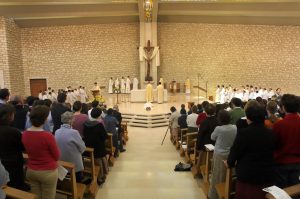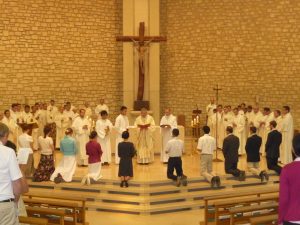Do you have any questions about the institute of Notre Dame de Vie, the life of its members or its spirituality ?
Please don’t hesitate to get in touch by clicking on the following link.
Below you’ll find also some answers to frequently asked questions
Do you live in community at Notre Dame de Vie ?
The house belonging to Notre Dame de Vie in Venasque is like a family home for the members of the Institute. They come back to it for times of replenishment, at the weekend or during their holidays. So the answer is :
- No, members live in their respective countries and towns, involved in their surroundings like any Christian. They don’t live at Notre Dame de Vie.
- Yes, when members are at Notre Dame de Vie for replenishment, the house lives according to a community rhythm which makes quiet times and sharing easier. Another reason for this community rhythm is because the house of Notre Dame de Vie in Venasque is also a house of formation.
What’s a secular institute ?
The way of life is secular, meaning that the members of a secular institute live in society like all laypeople, but combine this with consecrated life and its demands for the absolute.
To find out more, look at the section A secular institute.
What’s the difference between a religious and a consecrated layperson of Notre Dame de Vie ?
To answer this question, we have to distinguish between two aspects :
- Consecrated life : the profession of the evangelical counsels by vows of poverty, chastity and obedience is common to religious orders and secular institutes. So there’s no difference as far as the complete consecration to God is concerned.
- The way of life : the way of living out the consecration is, however, radically different. While a religious is generally called to live separate from the life of the world by a distinctive habit, a community life and a rhythm that witness to the heavenly city, the consecrated layperson is called to be the yeast in the dough of the world’s life, shaping it according to the gospel. So the difference in the way of living out the consecration is total.
To find out more, look at the section Who are we?.
Why don’t the laymen become priests ?
Indeed, God takes the initiative and man responds.
So consecrating yourself to God is a free call, with no other explanation than God’s generosity towards his creatures. Some men are therefore called to give their lives completely but, having said that, aren’t called to become priests. At Notre Dame de Vie, they make up the laymen’s branch : they are the Sons of Notre Dame de Vie.
What’s your apostolate ?
Members of Notre Dame de Vie live an ordinary life in society. They carry out many different professions (laypeople) and ministries (priests).
(Benedict XVI, Caritas in veritate, 6)
Do you go to Mass every day?
But Mass times can’t always be reconciled with work or simply with a life ‘outside the big city’. And like any Catholics, we have to face the fact that daily Mass is becoming rarer in many areas. As a result, participating in daily Mass is really linked to the type of life the member leads (place, working pattern).
If his situation doesn’t allow him to receive the Eucharist habitually, he’ll be ready to change his work.
Do you make private or public vows ?
Since the reform of Canon Law in 1983, there’s no longer a distinction between private and public vows.
Through the intermediary of the Congregation for Institutes of Consecrated Life and Societies of Apostolic Life, the Church recognizes the stable and plenary commitment of everyone who has professed the evangelical counsels of poverty, chastity and obedience, whatever their way of life (cf. the difference between a religious and a layperson, question above).
How do you manage to find the time to do two hours of silent prayer a day with a busy working life ?

Mothers, for example, don’t ask themselves if they should take care of the children : they generally devote several hours to them between getting up and going to bed, even if these mothers go to work. And that’s without taking into account the fact that, to give another example, a significant proportion of our contemporaries spend more than two hours a day in front of the television …
In short, loving and praying is a choice and it’s “enough” to organize yourself to make that choice.
Do you spend holidays with your family ?
The commitment to Notre Dame de Vie involves regular and lengthy stays in a house of replenishment. Practically speaking, that takes up most available holidays.
Furthermore, a consecrated person is given to God in the institute where she realizes her vocation, which implies a degree of detachment in family relationships. However, as always at Notre Dame de Vie, this does depend on circumstances.
In a general way, when families need help or support, members of Notre Dame de Vie will spend much more time with them, as far as possible. Fr Marie-Eugene was very attentive to the families of members of the Institute.
Following him, the co-founder Marie Pila wanted to be able to offer parents of members of Notre Dame de Vie a place where they could be welcomed in their retirement. In this way a house of the third age was founded and dedicated to this purpose in the village of Venasque.
So the answer to this question is neither fully “yes” nor fully “no” : it’s all a matter of nuance and flexibility, as times and needs require !
Are the couples of Notre Dame de Vie consecrated ?
The couples of Notre Dame de Vie are people who want to live Carmelite spirituality and the charism proper to the institute of Notre Dame de Vie. In this way they are progressively led to commit to deepening their personal relationship with Christ by means of a daily time spent in silent prayer, and to witnessing to God in the world by living a profoundly Christian family life.
To find out more, you can read the article on “Associates and couples“.
How do you decide what work to do ?
The choice of what work to do is made in dialogue between the member and the person in charge of him or her. The member’s professional talents and working life so far are taken into account, as well as the needs of the Institute and many other factors.
After this conversation, the member welcomes the final decision of the person in charge in a spirit of faith, exercising in this way the vow of obedience.
It can truly be said that it’s a question of ‘each case on its own terms’, and that this is appropriate for a secular institute, founded for all the environments and all the (lawful) jobs that exist here on earth.






